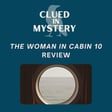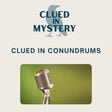Introduction to Medical Mysteries
00:00:11
Speaker
Welcome to Clued in Mystery. I'm Sarah. And I'm Brooke, and we both love mystery. Hi Brooke. Hi Sarah, how are you doing today? I'm doing great, how about you? Good, I'm ready to talk mystery.
Why Do Medical Professionals Make Great Sleuths?
00:00:28
Speaker
And not just mystery, but medical mysteries today.
00:00:31
Speaker
That's right. Yeah, so in previous episodes, we've discussed some professions that lend themselves well to amateur sleuthing, like authors, politicians, or reporters. And today we're discussing another type of job that's ideal for sleuthing on the side, physicians and other medical professions.
Doctors and Detectives: A Comparison
00:00:52
Speaker
Now, all murder mysteries have some type of medical component. There's been an injury, an accident, a poisoning, or some other type of fatal harm to a person. Discovering the cause of death is a key component to solving the case. But when the main character who decides to investigate the murder is a nurse, a coroner, or a surgeon, we know the plot will more closely revolve around the medical aspects of the case.
00:01:21
Speaker
When you think about it, doctors and detectives have a lot in common. They both look for clues and make detailed observations in order to figure out what's wrong and how it might be fixed.
Transition from Doctor to Detective
00:01:33
Speaker
If a contagious illness is broken out, a medical professional's job is the same as the detective's at a crime scene, to identify the killer before it claims any more victims. Add to this the trust we tend to place in doctors and their easy access to crime scenes, sometimes even at the request of law enforcement,
00:01:54
Speaker
and the leap from doctor to detective becomes quite natural.
Famous Fictional Medical Sleuths
00:01:58
Speaker
It's easy for us as mystery readers to accept that such a character would take on the case. Sherlock Holmes' sidekick Dr. John Watson comes to mind. Although he wasn't the main investigator on their cases, he was an intelligent sounding board for Sherlock. Watson's medical knowledge was helpful to Sherlock many times.
00:02:20
Speaker
Other more contemporary examples of medical sleuths include Patricia Cornwell's Kay Scarpetta, a medical examiner, and Karen Slaughter's Sarah Linton, a coroner.
Strengths and Weaknesses of Medical Thrillers
00:02:32
Speaker
From TV, we remember Dr. Temperance Brennan, or Bones, and diagnostic genius Gregory House, who was able to deduce more than just the disease of the week.
00:02:44
Speaker
In lighter mystery tales, you'll find sleuths who are nurses, midwives, and natural medicine specialists. For fans of the mystery thriller category, there are many standalone stories where the menace being chased after
00:02:58
Speaker
is a disease or a contagion. In these, a team of gifted doctors must defeat the threat before it wipes out a population. Here, the story isn't a whodunit, but the heroes are still the medical professionals who are tasked with defeating the force of evil.
The Appeal and Drawbacks of Medical Mysteries
00:03:16
Speaker
For me, this subgenre has some strong pros and some strong cons, and I wonder if it's the same for you, Sarah. So let's talk about medical-themed mysteries.
00:03:27
Speaker
Well, thanks for that summary, Brooke. You've brought up a lot of great points, and I want to dig into some of them. But let's start with your question. And yeah, I agree. There's things I like about medical mysteries, and then there's some things that don't have me picking them up as frequently.
00:03:46
Speaker
Yeah. I find that the amount of discussion of like the actual wounds and injuries, like it can be a little gory, right? Because these are going to be very technical discussions usually. And sometimes that can be too much for me.
00:04:05
Speaker
I agree. I don't need a lot of graphic detail about the
Popularity of Medical Mysteries in Media
00:04:12
Speaker
process of handling the body if it's the medical examiner. I don't really need to get into that. But I think most authors recognize that and are pretty good about summarizing the steps that they take.
00:04:34
Speaker
Mm-hmm. Yeah. Some series are more gritty than others. And that gets in with like technical as well. Like I think a really great medical mystery author won't make the jargon too technical or too lengthy. Uh, and, but that can be also can be a drawback in some series. Yeah. And,
00:05:00
Speaker
I mean, they are very popular, right? Like when you think you mentioned Bones, House. There's a series from the UK called Silent Witness where it's like a pathologist's office and the characters are, you know, solving how did this body get to be something that they're looking at. And these are all very long running series. So they're obviously very popular with, certainly with viewers.
Personal Experiences with Medical Mystery Series
00:05:30
Speaker
Definitely. And the same goes for some of these book series, right? I mentioned the Patricia Cornwell series and then Karen Slaughter. I mean, those have many, many books in them, so definitely popular to readers as well. I have to say, so I've read a few of the early books in the Patricia Cornwell series, and I read a few of the later books, and I didn't like those ones as much as the earlier ones.
00:06:01
Speaker
And I've also read several books written by Kathy Reichs, who is the creator of the character that is Bones in television. But there's a whole series of books that came first before it was on TV. I would completely agree about the Kaye Scarpetta.
00:06:21
Speaker
series and I had the exact same experience. I was reading along and then I don't know at what point I got to and I was like, I just don't. And it was partly because of the darkness of it. It does tend to get darker as the series progresses. I haven't read any Karen Slaughter though. Have you read any of her books?
00:06:41
Speaker
I haven't, but in looking at this information for today, I was reading some descriptions of the first book in the series and everything, and it sounds great. The character of her coroner, who is named Sarah Linton, sounds really interesting, and I believe that she's married to a police detective, so it could be a great tie-in to work on cases and to stay involved.
00:07:08
Speaker
So it sounds like something I might want to check out. I did think of another series where a coroner is the main character and this is the reluctant coroner series and his character is she's actually a nurse practitioner and she's taking forensic classes and
00:07:25
Speaker
I don't remember exactly how it happens, but she ends up becoming the coroner in a small town in California. And she draws on her medical knowledge and the things that she's learned in these forensic courses that she's taken and investigates. I think it's a series of deaths in the first book. And I've read the first couple of books in the series and I really like it.
00:07:53
Speaker
Oh, that sounds fantastic and very familiar to me because I, as I've mentioned before, I live in a rural area and county coroners are elected officials in these small towns. And so they may not be an actual physician, but maybe they have EMT experience or they've, you know, have some level of medical training, but, you know, haven't been to medical school per
Doctors as Mystery Writers
00:08:16
Speaker
se. And I've always thought what an interesting amateur sleuth that would make because
00:08:22
Speaker
It kind of puts them in that in-between world as far as being a professional and yet being at these different crime scenes.
00:08:33
Speaker
And I think I've mentioned it before, but there was this television series that was filmed here in Vancouver, and it was named Da Vinci's Inquest after the main character, who I don't remember what his first name was, but his surname was Da Vinci, and he was the coroner. And so each episode, there was some death that he worked with, a police detective to determine what the cause was. And I believe that he was not
00:09:02
Speaker
a medical professional. But as you say, he was the coroner and it was his job to determine that cause of death. Yeah, really interesting.
00:09:15
Speaker
And that show reminded me, you know, a very long running television show was a diagnosis murder. And it ran from 1993 to 2001. And Dick Van Dyke was the coroner in this show. And Dick Van Dyke's
00:09:35
Speaker
real-life son played his son on the show who was a police detective. That gave that connection for the coroner and the police detective to work together and solve these cases. Talk about a popular show that ran just forever based on this medical mysteries.
00:09:58
Speaker
Well, and I think as you said in your introduction, when we're sick, we turn to doctors to be those detectives to figure out what's wrong with us, right? So it's a really logical connection that we would be seeing medical professionals as detectives in mystery stories that we enjoy.
Authenticity in Medical Mysteries
00:10:21
Speaker
Exactly. They really have to use a lot of the same type of thinking skills as far as whittling down the signs and symptoms to try to determine what the cause is and eliminating suspects, so to speak. There are a lot of similarities in that job. You could see how it makes for an easy leap to a fictional doctor as detective.
00:10:49
Speaker
One thing I like, particularly about Kathy Reich's books, is that, you know, so her character is this forensic anthropologist. But Kathy Reichs, who writes the books, she is also a forensic anthropologist. And so she really is drawing on her vast knowledge and experience when she's creating her stories. And
00:11:13
Speaker
I think we've talked before about people who write books with this sleuth as someone who's the same profession as them and just that extra bit of truth that gets into that writing.
00:11:30
Speaker
Absolutely. And especially in something like this, which is such a specific skill set, right? Like it's pretty hard to fake being a doctor if you're not a doctor or a medical examiner or whatever. And not to say that it can't be done and it can't be done well, but as you said, it's just like another level of richness and truth that comes through when somebody has actually done the work.
00:11:59
Speaker
So and I think there's several examples of medical professionals who've also penned mysteries. And I wonder if it isn't a little bit of catharsis for them after seeing what is probably some pretty grim stuff in real life. Like as readers, we just are imagining this. But they've probably seen very similar situations and had to deal with
00:12:29
Speaker
the reality of death in a way that readers, for the most part, have not had to.
00:12:40
Speaker
Yeah, great point and the catharsis exactly and a way to put the story the way that it that they would have loved to have seen it because let's face it in real life. Nothing is ever as cut and dry as we get to have it in a mystery story. Justice many times is actually not served or at least not to the degree that
00:13:05
Speaker
we'd like to see it wrapped up with a bow. And so I think that that would be really satisfying too if you have worked in this to be able to like write it the way you wish it would have happened.
Historical Contributions to Medical Mysteries
00:13:19
Speaker
Did I get that Christie write any medical mysteries? I know she certainly drew on her experience having worked in the pharmacy. And that's why there's so many deaths involving poison. But I don't remember. Roger Aykroyd, is a narrator a doctor?
00:13:44
Speaker
I feel like he is a doctor and I do think we have some doctors mentioned in several stories, but much of a straight medical mystery, I can't really think of one from the Christie canon. So I did read in one of the books by Martin Edwards that Marjorie Ellingham actually wanted to write a series featuring a pathologist as a detective, but her publisher preferred Albert Campion and so she'd never wrote any of those stories.
00:14:16
Speaker
Wow, that's so interesting and sad, in fact, because, you know, was that just because the Albert Campion character was kind of what was in Vogue at the time? And, you know, definitely something that was sellable was that just like, oh, stick with this.
00:14:35
Speaker
But who knows what could have come out of that? Because I mean, you mentioned Holmes and Dr. Watson being his sidekick. I feel like Patricia Cornwell was one of the first authors to write Medical Mysteries. I couldn't find, Sarah, anything much earlier than that. And I'm sure that if I dug deeper or if somebody who has more experience in the Medical Mystery
00:15:04
Speaker
sub genre there perhaps could be, but it's definitely not something that comes up easily in, um, in research. Uh, we have Watson and then, you know, some, some characters that are doctors and mysteries, but not the main character who's like carrying the story.
Conclusion and Listener Engagement
00:15:25
Speaker
Yeah. Interesting. So maybe Marjorie Ellingham was just really ahead of her time.
00:15:32
Speaker
Thanks, Brooke. This has been such an interesting conversation to talk about what is a very popular sub-genre in the mystery space. It definitely is, Sarah. And I know a lot of our listeners probably have some favorites, and maybe you'd like to share those with us. Thanks for listening today to Clued in Mystery. I'm Brooke. And I'm Sarah. And we both love mystery.
00:15:57
Speaker
Clued In Mystery is written and produced by Brooke Peterson and Sarah M. Stephen. Music is by Shane Ivers. If you liked what you heard, please consider telling a friend, leaving a review, or subscribing with your favorite podcast listening app. Visit our website at cluedinmystery.com to sign up for our newsletter, The Clued In Chronicle, or to join our paid membership, The Clued In Cartel. We're on social media at Clued In Mystery.

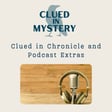
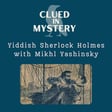
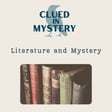
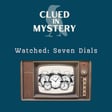
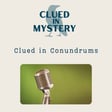
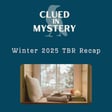
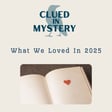
![[Re-release] Anthony Berkeley image](https://media.zencastr.com/cdn-cgi/image/width=112,quality=85/image-files/61e1c276e3ec42007857cff9/e7c778ac-a2ba-4809-9a5c-7cd39d167834.jpg)
![[Bonus] Wake Up Dead Man image](https://media.zencastr.com/cdn-cgi/image/width=112,quality=85/image-files/61e1c276e3ec42007857cff9/e276ac32-e664-464f-956c-7699bdb60aa5.jpg)
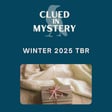
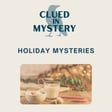
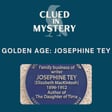
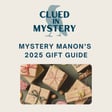
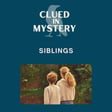

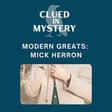
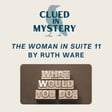
![[Bonus] Read Along: Daughter of Time image](https://media.zencastr.com/cdn-cgi/image/width=112,quality=85/image-files/61e1c276e3ec42007857cff9/b953ad72-c43e-48ca-a18a-b3c216ab90ee.jpg)
